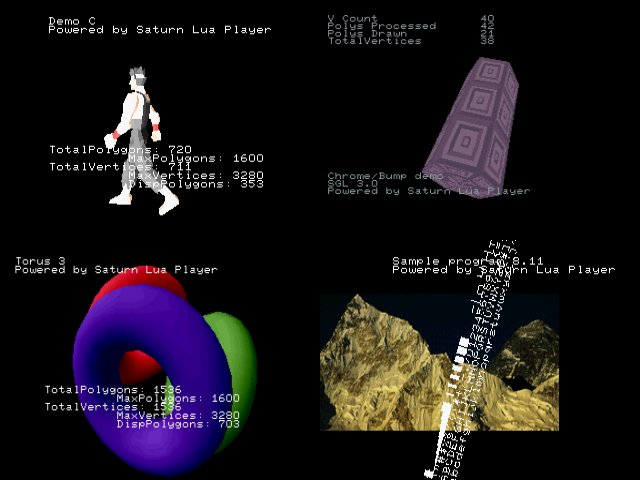Finally, writing SEGA Saturn games in Lua has become reality  !
!
Lua is a powerful, fast, light-weight, embeddable scripting language. The Saturn Lua Player is a powerful runtime environment for homebrew Saturn games written in Lua. It provides access to hundreds of functions of popular Saturn programming libraries.
The SLP runtime executable consists of a library and a small application part, it's designed such that new API calls can be easily added and that people can create custom Saturn apps, if they like to. However, it's already complete enough that whole games of any kind can be created entirely in Lua.
It's simple, it's fast, it's powerful and it makes fun ! Creating Saturn games is now as easy as opening up a text editor and writing:
! Creating Saturn games is now as easy as opening up a text editor and writing:
slPrint("Hello World", 5, 5) while true do slSynch() end
The Saturn Lua Player has proved it's usefulness by running Police Officer Smith and various complex 3d demos. It successfully handles multiple 2D scrolls, rotational scrolls, complex 3D scenery, realtime gouraud shading, textures, save files, CD reading, PCM playback and a lot more!

Download the all-in-one Saturn Lua Player package now:
SaturnLuaPlayer_080701_R1.zip (15 MB, Zip)
SaturnLuaPlayer_080701_R1.7z ( 8 MB, 7-Zip)
It includes 12 demos with prebuild ISOs, docs, tools and complete source code of the SLP runtime and all demos. Oh btw: it's intended for a future release to offer an alternative SLP executable that uses only homebrew code (CDC+SGL replacements).
 !
!Lua is a powerful, fast, light-weight, embeddable scripting language. The Saturn Lua Player is a powerful runtime environment for homebrew Saturn games written in Lua. It provides access to hundreds of functions of popular Saturn programming libraries.
The SLP runtime executable consists of a library and a small application part, it's designed such that new API calls can be easily added and that people can create custom Saturn apps, if they like to. However, it's already complete enough that whole games of any kind can be created entirely in Lua.
It's simple, it's fast, it's powerful and it makes fun
 ! Creating Saturn games is now as easy as opening up a text editor and writing:
! Creating Saturn games is now as easy as opening up a text editor and writing:slPrint("Hello World", 5, 5) while true do slSynch() end
The Saturn Lua Player has proved it's usefulness by running Police Officer Smith and various complex 3d demos. It successfully handles multiple 2D scrolls, rotational scrolls, complex 3D scenery, realtime gouraud shading, textures, save files, CD reading, PCM playback and a lot more!

Download the all-in-one Saturn Lua Player package now:
SaturnLuaPlayer_080701_R1.zip (15 MB, Zip)
SaturnLuaPlayer_080701_R1.7z ( 8 MB, 7-Zip)
It includes 12 demos with prebuild ISOs, docs, tools and complete source code of the SLP runtime and all demos. Oh btw: it's intended for a future release to offer an alternative SLP executable that uses only homebrew code (CDC+SGL replacements).

